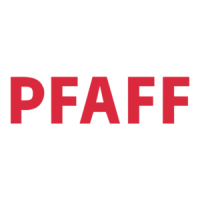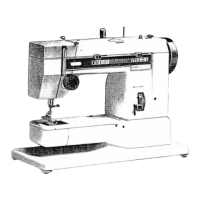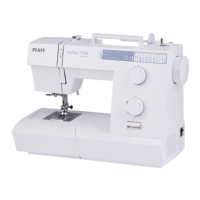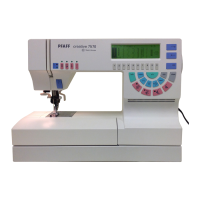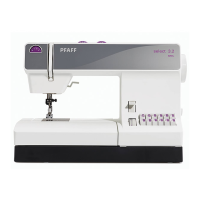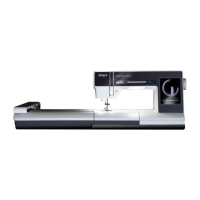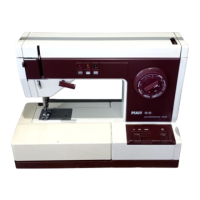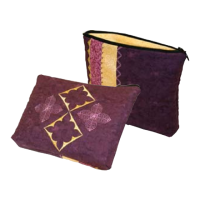Do you have a question about the Pfaff 8330 and is the answer not in the manual?
Machine compliance with European regulations and user country laws.
Essential safety precautions for machine operation and maintenance.
Explanation of danger and caution symbols used in the manual.
Important instructions for users regarding machine operation and manual.
Safety requirements for operating and technical staff.
Details specific hazards, safety distances, and protective measures.
The PFAFF 8330 is a hot-air tape sealing machine for membrane materials.
Provides physical specifications like length, width, height, and net weight.
Details electrical, air pressure, noise, and temperature specifications.
Customer is responsible for proper disposal according to local regulations.
Lists materials used in machine construction for disposal considerations.
Covers transport to customer premises and within the premises.
Guidance on disposing of packing materials like paper and cardboard.
Recommendations for storing the machine to prevent damage and corrosion.
Explains symbols for notes, cleaning, lubrication, and technical work.
Identifies key components like main switch, pedals, and control panel.
Lists and briefly describes major controls such as pedal, lift limiter, and rollers.
Instructions on how to turn the machine on and off using the main switch.
Details the different functions assigned to pedal positions (neutral, roller, start).
How to adjust the distance between the top and bottom feed rollers.
Procedure for adjusting the top lift limit of the feed roller.
Explains the display and interaction on the control panel for operation.
Ensures qualified personnel and safety regulations are followed during setup.
Procedure for adjusting the table height for optimal ergonomics.
Instructions for attaching the reel holder for the sealing tape.
Steps for initial setup, checks, and connecting compressed air.
Detailed steps for powering the machine on and off safely.
Guide to setting the machine's language and measurement units.
How to properly mount and feed the sealing tape onto the reel holder.
Adjusting the brake to control tape tension and unwinding.
Ensuring the sealing tape runs correctly through guides and rollers.
Setting the gap between feed rollers based on material thickness.
Choosing between manual, programmed, or dynamic heat sealing modes.
Selecting or entering sequence numbers for programmed operations.
Overview of parameters like temperature, speed, and pressure for manual sealing.
Procedure for adjusting the heat sealing temperature and its range.
Setting the feed speed and speed difference between rollers.
Selecting nozzle type and adjusting hot air volume.
Adjusting the pressure applied by the feed rollers.
Adjusting display contrast and other control panel settings.
Explains the fundamental conditions for optimal heat sealing results.
Overview of Manual, Dynamic, and Programmed heat sealing types.
Detailed guide to performing and configuring manual heat sealing operations.
Description of functions like selecting programs, pressing, temperature, and speed.
Details functions for roller pressure, start, feed roller movement, and tape cutting.
Instructions for operating the machine in dynamic heat sealing mode.
Details functions for roller pressure, feed roller movement, and tape cutting in dynamic mode.
Steps for creating new programs or editing existing ones with zones.
Using the notepad to enter and store information about sealing tools.
Functions for navigating zones, inserting/deleting zones, and concluding programming.
Setting heat sealing temperature, speed, nozzle, and roller pressure per zone.
Configuring programmed section, stop, output, and input for zone transitions.
Setting acceleration, brake profiles, and start delay for feed rollers.
Finalizing program creation with save, discard, or escape options.
Walkthrough for creating program '10' with three seam zones and specific parameters.
Adding comments and details to the sample program.
Setting seam length and zone switching for the first zone of the sample program.
Configuring speed and zone switching for the second seam zone.
Configuring speed and zone switching for the third seam zone.
Concluding the program input and confirming the sealing program.
Selecting and viewing programmed parameters like program number, zones, and comment.
Description of functions like program selection, notepad, pressing, and start.
Details functions for feed roller movement, tape cutting, input menu, and stop.
Steps to create and manage sequences of heat sealing programs.
Selecting sequences and viewing programmed parameters for each program within a sequence.
Description of functions like program selection, notepad, pressing, and start for sequences.
How to identify, eliminate, and acknowledge machine errors.
Details functions like Heat Sealing Mode, Info, Program Management, Further Settings, and Service Menu.
Description of functions like piece counter, tape parameters, pause, programming, and roller controls.
Accessing and managing programs, configuration, and machine data.
Functions for input menu, refresh, sealing mode, data selection, and copying files.
Details on deleting files, accessing configuration data, and formatting media.
Configuration of tape feed, start action, light barrier, and disengaging path.
Functions for fixing tape in the guide unit and performing tape cutting operations.
Details functions for feed unit movement, temperature window, and pedal modes.
Setting parameters for feed rollers, automatic heat-up, and pre-heating.
Settings for country, language, and access rights.
Functions for sealing mode, acceleration/brake profiles, and roller pressure limits.
Classifying functions by code, protecting access with PINs for user groups.
Functions for input, settings, sealing mode, PIN entry, function selection, and locking.
Table mapping functions to code numbers and user access levels (User 1, 2, 3).
Visual representation of manual, dynamic, and programmed heat sealing processes.
Diagrams showing sequence programming, parameter input, and local settings.
Specifies tasks like cleaning nozzles, air filters, and changing rollers.
Instructions for cleaning the hot air nozzle and air filter/lubricator.
Step-by-step guide for replacing the feed rollers.
Important considerations for expert staff performing adjustments, including safety.
List of necessary tools like screwdrivers, wrenches, and allen keys.
Procedure for centering and aligning the feed rollers.
Adjusting the hot air nozzle's position for lateral centering.
Adjusting nozzle height and feed roller gap for optimal sealing.
Aligning the hot air nozzle to the correct angle for sealing.
Step-by-step instructions for safely replacing the heating cartridge.
Procedure for replacing the temperature sensor for accurate readings.
Performing adjustments after component replacement, referring to other sections.
Procedure for adjusting knife pressure, angle, and replacement.
Adjusting air jets for proper tape feeding and cutting.
Procedure for resetting the protective switch after a fault.
Using the boot key to start up the machine control unit.
Details functions like cold start, machine configuration, program loading, and panel settings.
Setting up machine components like roller diameter, gear factor, and air volume.
Instructions for updating machine software using a floppy disk.
Procedure for updating machine software via an SD-Card.
Details on the update process, including force update and erasing old application.
Configuring advanced parameters through the machine configuration menu.
Comprehensive list of adjustable parameters, their ranges, and functions.
Lists common error codes (3-319) and their associated issues.
Details specific errors like speed, temperature, and air volume issues.
Error codes related to temperature sensor and control circuit malfunctions.
Error codes related to DC motor faults and overloads.
Table listing digital outputs (HW/SW Term) and their associated functions.
Table listing digital inputs (HW/SW Term) and their functions.
Table listing analog outputs and their functions.
Table listing analog inputs and their functions.
Explains errors when switching outputs, referencing status and causes.
Detailed examples of feed roller errors (Y1, E1) and their troubleshooting.
Examples of errors related to nozzle engagement/disengagement (Y3, E1, E4, Y10, E3).
Examples of errors for nozzle forward/backward movement (Y4, E4).
List of valves, cylinders, and sensors used in pneumatic circuits.
Diagram showing pneumatic components and their connections in basic position.
Diagram showing pneumatic controls for tape cutting and air blasts.
Alphabetical list of electrical components (A1, F1, M1, Q1, Y1 etc.) with descriptions.
Circuit diagram illustrating power supply, fuses, and connections to controller A1.
Diagram showing connections from outputs (AUS) to pneumatic control valves (Y1-Y12).
Diagram showing connections from digital inputs (EIN) to switches and sensors.
Diagram illustrating connections for analog inputs (AE) and sensors.
Diagram showing connections to floppy drive (A3) and serial ports.
| Brand | Pfaff |
|---|---|
| Model | 8330 |
| Category | Sewing Machine |
| Language | English |
